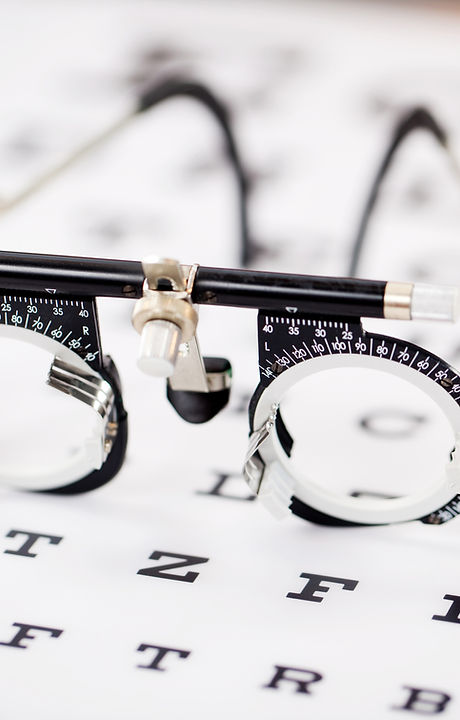Boldmere Road - 0121 354 6411 - Lichfield Road - 0121 308 1886
Your Eye Examination Explained
There is much more to your eye examination at our practice than finding out if you need spectacles or contact lenses. We also carry out a range of tests to assess the health of your eyes. Because everyone's eyesight is different, we tailor the eye examination to your individual circumstances. This may include the following elements and other tests where appropriate, based on our professional evaluation of your visual requirements.

History and symptoms
First of all, we discuss any problems you might have with your eyesight and general health. Many eye conditions are health-related and it is important that you let us know if you are taking any medicines as these may affect your vision. To assess your visual needs, we also discuss your work and leisure activities.
Spectacle Assessment
If you already wear spectacles or contact lenses, you should bring these to your appointment. We will then check the lenses to establish their type, optical power, and how well you can see with them.


Refraction
This part of the examination finds out whether you need an optical prescription and, if so, which lenses give you the best vision. We check your near vision (for reading), your distance vision (for driving or television) and your intermediate vision (for hobbies or computer work). These refraction tests will reveal if you are short-sighted, long-sighted, presbyopic or have astigmatism. As everyone's vision changes over time you may experience one or more of the above conditions. However all can be corrected with spectacles or contact lenses.
Oculomotor Balance
It is important that you eye muscles work together. This checks that both your eyes are co-ordinated and that you have comfortable vision at all distances.


Pupil Reflexes
The pupil controls the amount of light reaching the retina at the back of your eye and so affects images seen by the brain. An unusual pupil reflex may indicate neurological problems.
Intraocular Pressure
This test measures the pressure inside your eyes. Too much pressure can indicate glaucoma, a disease that can lead to blindness if untreated. This test is usually carried out on people over 40 or those with glaucoma in the family. The results are evaluated in conjunction with a visual field test and ophthalmoscopy.


Ophthalmoscopy and Eye Photography
This is a very important part of your examination because it checks the health of your eyes. Using a hand-held instrument called an ophthalmoscope, a light is shone through your pupil into the eye. This enables us to see the internal parts clearly, such as your lens, retina and optic nerve, and so check for problems like diabetes, cataracts, hypertension, glaucoma and macular degeneration. A photograph of your eye will also provide a permanent picture for future reference, and helps to pick up changes in your eye earlier, and allows better monitoring of any changes to your eyes.
Visual Assessment
When your eye examination is finished, we will give you an explanation of vision and your eye health, plus a copy of your optical prescription. We will then recommend a time for your next eye examination based on your visual needs. Our practitioner will also be happy to answer any questions you may have about your eyesight and the examination.


Looking after your eyesight
The key to good vision is having regular eye examinations. Their importance cannot be overstated because they provide an essential health check as well as helping you to see better with an up-to-date prescription.
Our practice offers both NHS and private sight tests. Many people are now entitled to free examinations under the NHS and are eligible if you belong to one of the groups listed below. You may qualify for NHS help with the cost of your glasses or contact lenses, so please ask us for further details.
Free NHS eye examinations
All children under 16 and people under 19 in full-time education
Everyone aged 60 or over
Diabetics or people suffering from glaucoma
Those aged 40 or over who are parents, brothers, sisters, or children of diagnosed glaucoma sufferers
Those diagnosed by a consultant ophthalmologist as being at risk of developing glaucoma
People receiving universal credit, or pension credit guarantee credit
People named on a valid NHS tax credit exemption certificate
People registered blind or partially sighted
People receiving an income-based job seekers allowance
People with a valid HC2 certificate
prescribed complex lenses under the NHS optical voucher screen


How can we help you
Our practice is committed to the highest standards of professional eyecare. This means we will discuss your individual needs, examine your eyes thoroughly, use modern equipment, answer your questions, and only offer you eyewear that meets your requirements. As independent opticians, we also believe in giving you a friendly and personal service.
Everyone deserves the best possible eyesight at all times. So if you haven't had an eye examination within the last two years, call us now for an appointment.


